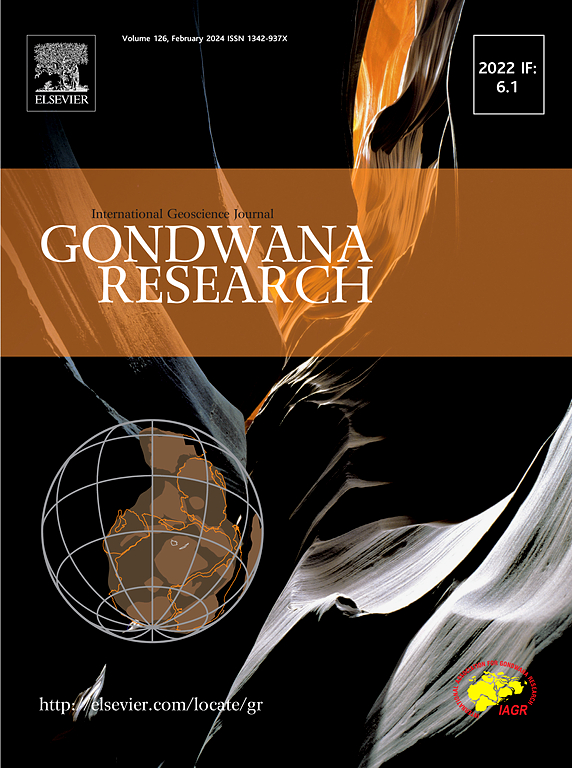评估极端降雨引发的山体滑坡发生率未来变化的模型框架
IF 7.2
1区 地球科学
Q1 GEOSCIENCES, MULTIDISCIPLINARY
引用次数: 0
摘要
在气候变化的情况下,极端降雨引发的山体滑坡对生命和生计构成严重威胁。然而,气候变化对极端降雨的频率和强度以及由此引发的滑坡危害的影响仍然没有得到充分研究。在此,我们利用中国广东省滑坡事件的综合数据集,开发了一个新颖的框架来评估极端降雨的未来变化如何影响滑坡的发生。我们采用 XGBoost 机器学习算法,通过特征交互约束进行修正,根据各种诱发和触发因素建立滑坡危害模型。我们使用一种新的极端降雨量修正方法来解释全球气候模型预测的不同排放情景下降雨模式的变化,并在此基础上进行多模型集合分析,以减少气候预测的不确定性。我们发现,滑坡概率高的地区与强降雨事件密切相关,尤其是在陡峭和易侵蚀的河谷地区。我们的预测表明,在高排放情景下,广东的极端降雨事件和滑坡灾害将大幅增加,这凸显了适应气候变化和风险管理的紧迫性。我们的框架为理解气候变化、极端降雨和滑坡发生之间的相互作用以及制定有效的减缓战略提供了宝贵的工具。本文章由计算机程序翻译,如有差异,请以英文原文为准。

A modeling framework for assessing the future changes in the occurrence of extreme rain-induced landslides
Landslides triggered by extreme rainfall pose a serious threat to lives and livelihoods under climate change. However, the influence of climate change on the frequency and intensity of extreme rainfall and the resulting landslide hazard remains insufficiently investigated. Here we develop a novel framework to assess how future changes in extreme rainfall affect landslide occurrence, using a comprehensive dataset of landslide events in Guangdong province, China. We apply the XGBoost machine learning algorithm with a correction by feature interaction constraints to model landslide hazards based on various predisposing and triggering factors. We use a new extreme rainfall correction method to account for the global climate model-projected changes in rainfall patterns under different emission scenarios, based on which we perform a multi-model ensemble analysis to reduce the uncertainty of climate projections. We find that regions with high landslide probability are strongly associated with intense rainfall events, especially in steep and erodible river valleys. Our projections show that under a high-emission scenario, extreme rainfall events and landslide hazards will increase substantially in Guangdong, highlighting the urgency of adaptation of climate change and risk management. Our framework provides a valuable tool for understanding the interactions between climate change, extreme rainfall, and landslide occurrence, and for developing effective mitigation strategies.
求助全文
通过发布文献求助,成功后即可免费获取论文全文。
去求助
来源期刊

Gondwana Research
地学-地球科学综合
CiteScore
12.90
自引率
6.60%
发文量
298
审稿时长
65 days
期刊介绍:
Gondwana Research (GR) is an International Journal aimed to promote high quality research publications on all topics related to solid Earth, particularly with reference to the origin and evolution of continents, continental assemblies and their resources. GR is an "all earth science" journal with no restrictions on geological time, terrane or theme and covers a wide spectrum of topics in geosciences such as geology, geomorphology, palaeontology, structure, petrology, geochemistry, stable isotopes, geochronology, economic geology, exploration geology, engineering geology, geophysics, and environmental geology among other themes, and provides an appropriate forum to integrate studies from different disciplines and different terrains. In addition to regular articles and thematic issues, the journal invites high profile state-of-the-art reviews on thrust area topics for its column, ''GR FOCUS''. Focus articles include short biographies and photographs of the authors. Short articles (within ten printed pages) for rapid publication reporting important discoveries or innovative models of global interest will be considered under the category ''GR LETTERS''.
 求助内容:
求助内容: 应助结果提醒方式:
应助结果提醒方式:


